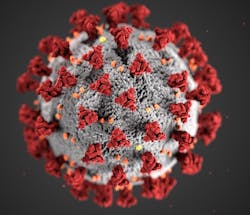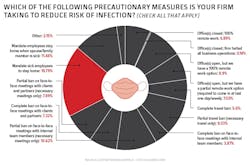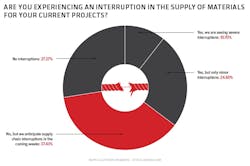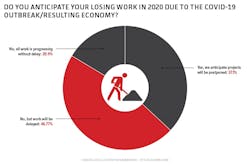UPDATED: Roads & Bridges' survey results on the effects of COVID-19 (Coronavirus) on industry operations
Roads & Bridges Media recently surveyed our readership to find out how the ongoing and accelerating effects of COVID-19, or coronavirus, are impacting the road and bridge construction and maintenance industry. This report will be updated each week based on trends and shifts as observed in the survey results. The survey remains OPEN HERE.
March 30: The results thus far have been in line with expectations—but also, in unexpected ways, somewhat surprising.
The primary respondent groups for this survey have identified themselves as:
- From a consulting engineering firm (36%)
- Department of transportation or other gov’t body (30%)
- Contractors (20%)
- Other occupations (14%); these include materials suppliers, testing firms, subcontractors, etc.
As you see below, companies and agencies are taking a plethora of actions to assuage or otherwise mitigate the impacts or potential impacts of the pandemic. It is uniquely complicated for people in our industry, as what we do – both objectively and with regard to how governing bodies are now classifying work – is essential. Thus, construction companies and DOTs alike are facing incredibly tough choices between keeping the country and its supply routes healthy and moving, and keeping the crew members responsible for that health healthy themselves.
The most telling response, which came in anonymously, was from one respondent who wrote, simply: “Stress & anxiety are making it nearly impossible to focus on work.” While we’ll look at stats here, we ask that you bear in mind the individual human impacts of this pandemic; such impacts are front-of-mind for R&B editors.
For the most part, mild impacts are being felt and expected (47%), while “sizable” impacts are being realized by a further 39%; only 8% believe there will be “severe” impacts, and it would not be conjecture to posit that a good portion of these respondents are involved, in some way or another, in the supply chain of materials. More than one-third of respondents are already seeing supply chain impacts; this is an increase since late March. And another ~37% see them coming down the pike—sooner, perhaps, than later. This seems to be indicative of a strengthening interruptive trend in the supply chain; both minor and severe interruptions have grown 3% according to respondents in just a matter of weeks.
Overall, impacts are tough to judge thus far; mostly firms and DOTs are anticipating slowdowns and project pauses, until a firmer grip can be had on precisely how the spread of the virus is, or can be, contained in various pockets of the nation.
We concluded our survey with an open-ended question to this effect: “Do you anticipate long-term impacts to the transportation infrastructure and the roads/bridges environment as a result of the outbreak/resulting economy? For instance, will remote work go mainstream? Will certain road/build construction sectors experience a severe downturn?”
Below please find a selection of curated responses; respondents’ anonymity has been retained.
Latest:
They need to completely shut it all down. Specifically construction. How can you get any work done being six feet apart. It takes at least two or more to do many aspects of the job. Who isn't wearing gloves - guys touching the same tools and equipment. Port O lets with no cleaning products at all, no soaps, or any hand sanitizer. Construction one of the worst places to do work safely as far as keeping far away from each other, sneezing could go airborne up to 27 feet.
| We are forecasting a long-term impact in our qued projects and the contributing market segments. Financial stability in our private sector clients and funding source access for our municipal clients in a post-crisis economy appears to be the leading reason for project delay or outright project cancelation. Within our professional sphere, crisis-induced disruptions will change the landscape with smaller firm closures, employee flight from the New England region, and institutional knowledge loss in the changing business environments. |
Long term impacts unknown but many revenue streams are drying up as fewer people are driving. Remote work will be leveraged, no new projects will be added for 3 years, and budgets are being cut.
Previous:
While most projects are proceeding on schedule, procurement of new work has slowed down and new hires are impacted since they cannot enter an office. projects are expected to be delayed and spending may slow down by public agencies experiencing similar resource challenges.
Yes. Lower sales tax revenue will impact my City's General Fund and as a result our Streets Department. A Federal Stimulus Funding Package may offset this impact some, but it will not completely replace the maintenance and operations funding that is primarily provided through sales and property tax revenues. I believe my City will have an increase of delayed and deferred street maintenance in the coming 6 to 18 months.
Remote work might actually improve work with more digital collaboration and BIM software. On the projects' side, working mostly on government's projects, we are expecting many resources to be diverted to deal with the outbreak so many projects will be delayed and cancelled. On the other side, governments used our industry before to quickly open many positions when unemployment rose. So there is an optimistic scenario in which we will see more projects as a result of this outbreak.
We established the remote work as part of our business model two years ago. The current situation and the expected development of the outbrake may force us to make that trend even more widely implemented.
No we anticipate a robust return when MEDICAL PROFESSIONALS declare it safe and feasible
The greatest concern we have at this time is the impact of a "total closure" or "shelter in place" type of restriction - so much of our work involves and requires physical presence. There is no such thing as "virtual road construction" or "virtual soil testing".
I believe that remote work will go more mainstream where it has been effective and efficiently applied during this period. I believe that lessons learned from this event will be widespread throughout both vertical and horizontal factors for just about all sectors. With time, we will be leaner, and more efficient.
Currently no significant impacts yet because construction projects were and are shut down to winter. There may be impacts once construction begins in May but my agency is striving to stay on schedule to prevent impacts to infrastructure and economy that would result if volume of construction work is reduced. IT at my agency is increasing ability and capacity to facilitate remote access into network. Unlikely that modified working conditions will remain in place after the threat is over for most employees.
Hard to say everything is changing from day to day and sometimes from hour to hour. We are having problems with deliveries from subs and suppliers.From pipe to fencing supplies, to fabric to erosion control materiel's and so on...
This outbreak is going to hurt us, as we are a small construction company, that was about to begin our seasonal work. But town & city's wont allow that to happen. our work is all outside, our laborers could meet the 6' rule. I just hope we stay afloat for a bit longer, but winter $ is going quickly. Very sad situation. Pray for us all.
We will see more people/firms choosing work from home/remotely. The result will be somewhat reduced traffic on streets and highways and public transportation usage in the near term. A great opportunity to repair this nation's aging infrastructure. Thank you Roads & Bridges for being out there for us.




